#data transparency
Explore tagged Tumblr posts
Text
Data Transparency: How to Build Data Trust in an Organization

Organizations today are exploring ways to adapt to these ongoing changes by incorporating a culture of transparency that will help them position themselves to grow further in this evolving landscape. Read More: https://www.sganalytics.com/blog/data-trust-how-to-build-data-trust/
#Data Trust#Data Transparency#Future of Data Transparency#what is data transparency#transparent data encryption#why is data transparency important?
2 notes
·
View notes
Text
Aibidia Secures $28 Million in Series B Funding to Expand AI-Powered Tax Tech to the US Market
New Post has been published on https://thedigitalinsider.com/aibidia-secures-28-million-in-series-b-funding-to-expand-ai-powered-tax-tech-to-the-us-market/
Aibidia Secures $28 Million in Series B Funding to Expand AI-Powered Tax Tech to the US Market


Aibidia, a Finnish fintech innovator, has successfully raised $28 million in Series B funding, positioning itself to scale its AI-driven tax technology platform for multinational corporations across the US. The round, led by Activant with participation from existing investors DN Capital, FPV, and Icebreaker.vc, marks a pivotal moment in the company’s journey to bring advanced tax compliance and transfer pricing solutions to global enterprises facing increasing regulatory challenges.
Since its founding in 2018, Aibidia has become a critical part of the tax tech ecosystem for large corporations. Its platform, which automates and optimizes global transfer pricing and tax compliance processes, is already helping multinational giants like Unilever, Nokia, Dyson, and Delivery Hero navigate the complexities of international tax laws. By streamlining tax-related workflows and ensuring compliance with intricate and evolving global tax regulations, Aibidia allows businesses to mitigate risk and save valuable time.
Solving Complex Transfer Pricing Challenges with AI
Transfer pricing, the practice of setting prices for transactions between subsidiaries of a multinational company, is a critical yet often complex process. As global trade evolves, tax regulations such as the OECD’s BEPS 2.0 framework and the EU’s BEFIT initiative are tightening, increasing scrutiny from regulators worldwide. Aibidia’s AI-powered platform addresses these complexities by automating calculations, risk assessments, and scenario modeling to help companies stay compliant and avoid costly mistakes.
The platform centralizes tax data and integrates it with third-party data, creating a “single source of truth” for companies. This enables teams across departments and geographies to collaborate more efficiently, eliminating silos and ensuring all stakeholders have access to accurate, up-to-date information. Aibidia’s AI-driven insights not only help companies comply with existing regulations but also prepare for future shifts in the tax landscape.
Aibidia’s Expanding US Presence
The latest round of funding comes at a time when Aibidia is strategically expanding its footprint in the US, a key growth market. With over 15% of its revenue already coming from American clients, the company’s commitment to serving the US market is reflected in its recent opening of a Manhattan office. This expansion is backed by a growing demand for Aibidia’s tax solutions from US-based multinational corporations, including S&P 500 companies such as EPAM Systems, Aptiv, and Omnicom.
“Multinational corporations are facing an increasingly complex web of tax regulations,” said Hannu-Tapani Leppänen, CEO of Aibidia. “Our platform helps them operate global supply chains more efficiently and effectively. This funding will allow us to bring our technology to the US, where demand is rapidly growing.”
The investment will enable Aibidia to enhance its product offerings and accelerate its market penetration in the US, where its innovative use of AI to tackle transfer pricing and compliance challenges is garnering increasing attention.
AI and Machine Learning at the Core
At the heart of Aibidia’s success is its innovative use of artificial intelligence and machine learning. By leveraging advanced algorithms, Aibidia’s platform automates complex manual tasks that are typically time-consuming and prone to error. For example, its AI-powered solution calculates transfer pricing adjustments and performs risk assessments based on real-time data, ensuring accuracy and reducing reliance on external advisors.
The company’s machine learning capabilities also extend to predictive analytics, where the platform forecasts potential tax risks based on historical data and upcoming regulatory changes. This proactive approach to risk management is critical for multinational enterprises navigating the turbulent waters of global tax compliance.
Additionally, Aibidia’s platform incorporates AI-driven scenario modeling, allowing businesses to test different pricing structures and tax strategies before implementing them. This enables more informed decision-making and helps companies align their global tax strategies with business objectives.
Global Expansion on the Horizon
With a proven track record of success in Europe, Aibidia is now well-positioned to scale its solutions on a global level. The company serves over 100 multinational clients, with a focus on large enterprises with revenues of approximately €7 billion. As Aibidia’s US market share continues to grow, the company aims to expand into new international markets, providing an AI-powered solution for transfer pricing that is both scalable and adaptable to the specific needs of different regions.
The latest investment round validates Aibidia’s innovative approach to solving complex tax challenges and further cements its status as a leading player in the AI-powered fintech space. With a deep understanding of both technology and transfer pricing intricacies, the Aibidia team is poised to continue revolutionizing how multinational corporations approach global tax compliance.
What’s Next for Aibidia?
As Aibidia continues to innovate and expand, the company plans to launch additional features and products to support its clients’ evolving needs. These include enhanced integrations with leading ERP systems, further automation of tax reporting, and increased data transparency and accessibility.
For businesses dealing with complex transfer pricing issues, Aibidia’s AI-driven platform is proving to be an invaluable tool that not only helps with compliance but also unlocks new efficiencies and cost savings. As global tax regulations continue to evolve, Aibidia’s platform is set to remain at the forefront of the industry, helping businesses stay ahead of the curve.
The global tax technology market is expected to grow from $18.53 billion in 2024 to $36.72 billion by 2030, driven by the increasing complexity of tax regulations and the demand for automated solutions. This latest funding round, coupled with Aibidia’s growing presence in the US and beyond, signals a bright future for the company as it continues to redefine how enterprises manage their global tax operations in this rapidly expanding market.
#2024#Accessibility#ai#AI-powered#Aibidia#Algorithms#American#amp#Analytics#approach#artificial#Artificial Intelligence#attention#automation#billion#Business#CEO#collaborate#Companies#complexity#compliance#cost savings#data#data transparency#Enterprises#EPAM#EPAM systems#erp#eu#Europe
0 notes
Text
#Case Study#Creator Rights#Data Transparency#Digital Suppression#facts#Free Speech#life#Monetization Challenges#Podcast#serious#Shadow Banning#Social Media Accountability#Social Media Platforms#straight forward#truth#upfront#website#X Data Exports
0 notes
Text
A WHOIS query is a process used to retrieve the ownership and registration details of a domain name. It provides critical information such as the domain owner’s name, contact details, registration date, expiration date, and the registrar. WHOIS is an essential tool for managing internet domain names, ensuring transparency, and supporting legal and cybersecurity processes.
The visual depicts the WHOIS query process in a modern, digital theme. The screen displays domain details, surrounded by abstract elements representing data flow, such as binary code and glowing cyber visuals. This type of query is particularly useful for domain management, online reputation monitoring, and enhancing cybersecurity.
1 note
·
View note
Text
The Age of the Digital Precog: How AI Predicts Our Every Move
Just like the precogs could glimpse future events, AI sifts through enormous amounts of data to make informed guesses about what we’ll do next.
Whats On My Mind Today? Who Are You? How to passively gather personal information is a fascinating look into how businesses, marketers, and tech giants employ techniques to connect your protected data to the information you freely share. Passive information gathering means collecting data about a person without actively seeking it or requiring direct interaction. This can happen through…
#AI data gathering#ChatGPT#data transparency#digital privacy#digital surveillance#IoT privacy#MidJourney#passive data collection#personal privacy#predictive AI#public records#social media analysis#synthetic data
0 notes
Text
What is the importance of data lineage in certifying a report?
Introduction In a world inundated with information, report certification serves as a beacon of reliability. It empowers decision-makers, builds trust among stakeholders, and elevates the quality and credibility of information. Its importance cannot be overlooked in the pursuit of accuracy, transparency, and trust in today’s data-driven landscape. What is the process to certify a…
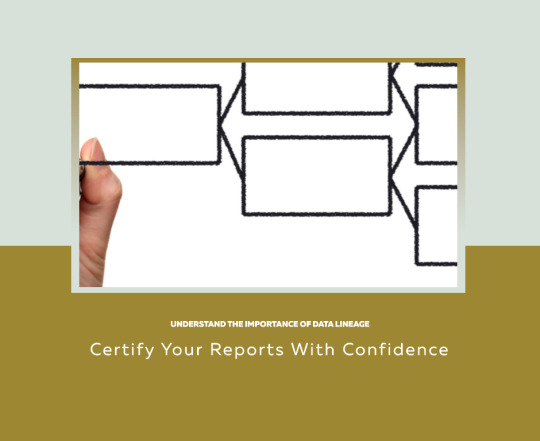
View On WordPress
0 notes
Text
So your Spotify Wrapped Kind of Sucked
This is probably our cosmic punishment for relying on such a shady platform. But still: I have this whole year of data? Just sitting there? I'd like to do something with it?
First the classic Stats for Spotify
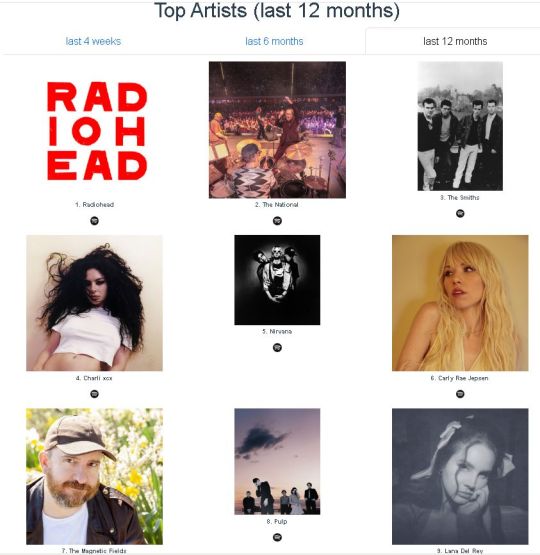
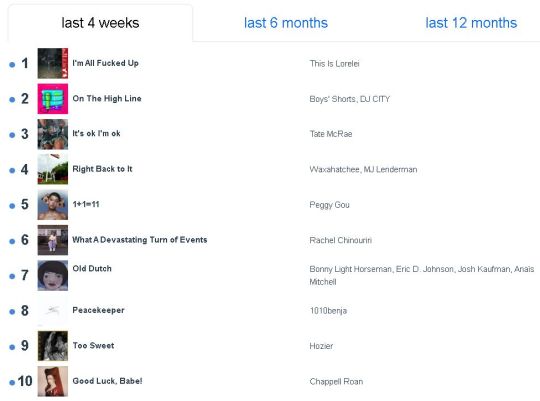
Or Instead: Obscurify



Or: Instafest

mine cuts off weirdly for some reason, but my computer is ancient so that's probably it.
Or: Iceburgify

And how about: Volt.fm
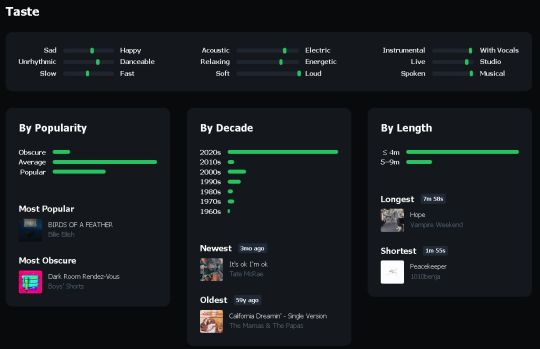
OR GET ROASTED

Go forth and make data visualizations!
#did I just make this to share my spotify results? yes. transparently yes.#but also wrapped really was weak#music posts#spotify#spotify wrapped#we want data not AI DJs lol
1K notes
·
View notes
Text
Building Data Trust: Unveiling the Path to a Transparent Data Future
In the age of data-driven decision-making, data has become the lifeblood of businesses and institutions. However, the critical need for Data Trust and Transparency comes with the increasing reliance on data. Our blog explores the significance of Data Transparency and its future for the data landscape. Delve into the realm of transparent data encryption and gain valuable insights into why Data Transparency is of utmost importance in fostering trust, accountability, and ethical data practices. Join us as we unravel the critical aspects of building Data Trust and shaping a more transparent and secure data-driven world.
#Data#Data Trust#Data Transparency#Future of Data Transparency#what is data transparency#transparent data encryption#why is data transparency important?
0 notes
Text


Kingdom Hearts Re:coded - Bugged Data-Riku & Bugged Data-Roxas
#kingdom hearts re:coded#khrecoded#bugged data-riku#bugged data-roxas#these are from the ultimania but i found a transparent version on the wiki#had to slap em on my blog because i love these guys
223 notes
·
View notes
Text
Palantir’s NHS-stealing Big Lie

I'm on tour with my new, nationally bestselling novel The Bezzle! Catch me in TUCSON (Mar 9-10), then SAN FRANCISCO (Mar 13), Anaheim, and more!

Capitalism's Big Lie in four words: "There is no alternative." Looters use this lie for cover, insisting that they're hard-nosed grownups living in the reality of human nature, incentives, and facts (which don't care about your feelings).
The point of "there is no alternative" is to extinguish the innovative imagination. "There is no alternative" is really "stop trying to think of alternatives, dammit." But there are always alternatives, and the only reason to demand that they be excluded from consideration is that these alternatives are manifestly superior to the looter's supposed inevitability.
Right now, there's an attempt underway to loot the NHS, the UK's single most beloved institution. The NHS has been under sustained assault for decades – budget cuts, overt and stealth privatisation, etc. But one of its crown jewels has been stubbournly resistant to being auctioned off: patient data. Not that HMG hasn't repeatedly tried to flog patient data – it's just that the public won't stand for it:
https://www.theguardian.com/society/2023/nov/21/nhs-data-platform-may-be-undermined-by-lack-of-public-trust-warn-campaigners
Patients – quite reasonably – do not trust the private sector to handle their sensitive medical records.
Now, this presents a real conundrum, because NHS patient data, taken as a whole, holds untold medical insights. The UK is a large and diverse country and those records in aggregate can help researchers understand the efficacy of various medicines and other interventions. Leaving that data inert and unanalysed will cost lives: in the UK, and all over the world.
For years, the stock answer to "how do we do science on NHS records without violating patient privacy?" has been "just anonymise the data." The claim is that if you replace patient names with random numbers, you can release the data to research partners without compromising patient privacy, because no one will be able to turn those numbers back into names.
It would be great if this were true, but it isn't. In theory and in practice, it is surprisingly easy to "re-identify" individuals in anonymous data-sets. To take an obvious example: we know which two dates former PM Tony Blair was given a specific treatment for a cardiac emergency, because this happened while he was in office. We also know Blair's date of birth. Check any trove of NHS data that records a person who matches those three facts and you've found Tony Blair – and all the private data contained alongside those public facts is now in the public domain, forever.
Not everyone has Tony Blair's reidentification hooks, but everyone has data in some kind of database, and those databases are continually being breached, leaked or intentionally released. A breach from a taxi service like Addison-Lee or Uber, or from Transport for London, will reveal the journeys that immediately preceded each prescription at each clinic or hospital in an "anonymous" NHS dataset, which can then be cross-referenced to databases of home addresses and workplaces. In an eyeblink, millions of Britons' records of receiving treatment for STIs or cancer can be connected with named individuals – again, forever.
Re-identification attacks are now considered inevitable; security researchers have made a sport out of seeing how little additional information they need to re-identify individuals in anonymised data-sets. A surprising number of people in any large data-set can be re-identified based on a single characteristic in the data-set.
Given all this, anonymous NHS data releases should have been ruled out years ago. Instead, NHS records are to be handed over to the US military surveillance company Palantir, a notorious human-rights abuser and supplier to the world's most disgusting authoritarian regimes. Palantir – founded by the far-right Trump bagman Peter Thiel – takes its name from the evil wizard Sauron's all-seeing orb in Lord of the Rings ("Sauron, are we the baddies?"):
https://pluralistic.net/2022/10/01/the-palantir-will-see-you-now/#public-private-partnership
The argument for turning over Britons' most sensitive personal data to an offshore war-crimes company is "there is no alternative." The UK needs the medical insights in those NHS records, and this is the only way to get at them.
As with every instance of "there is no alternative," this turns out to be a lie. What's more, the alternative is vastly superior to this chumocratic sell-out, was Made in Britain, and is the envy of medical researchers the world 'round. That alternative is "trusted research environments." In a new article for the Good Law Project, I describe these nigh-miraculous tools for privacy-preserving, best-of-breed medical research:
https://goodlawproject.org/cory-doctorow-health-data-it-isnt-just-palantir-or-bust/
At the outset of the covid pandemic Oxford's Ben Goldacre and his colleagues set out to perform realtime analysis of the data flooding into NHS trusts up and down the country, in order to learn more about this new disease. To do so, they created Opensafely, an open-source database that was tied into each NHS trust's own patient record systems:
https://timharford.com/2022/07/how-to-save-more-lives-and-avoid-a-privacy-apocalypse/
Opensafely has its own database query language, built on SQL, but tailored to medical research. Researchers write programs in this language to extract aggregate data from each NHS trust's servers, posing medical questions of the data without ever directly touching it. These programs are published in advance on a git server, and are preflighted on synthetic NHS data on a test server. Once the program is approved, it is sent to the main Opensafely server, which then farms out parts of the query to each NHS trust, packages up the results, and publishes them to a public repository.
This is better than "the best of both worlds." This public scientific process, with peer review and disclosure built in, allows for frequent, complex analysis of NHS data without giving a single third party access to a a single patient record, ever. Opensafely was wildly successful: in just months, Opensafely collaborators published sixty blockbuster papers in Nature – science that shaped the world's response to the pandemic.
Opensafely was so successful that the Secretary of State for Health and Social Care commissioned a review of the programme with an eye to expanding it to serve as the nation's default way of conducting research on medical data:
https://www.gov.uk/government/publications/better-broader-safer-using-health-data-for-research-and-analysis/better-broader-safer-using-health-data-for-research-and-analysis
This approach is cheaper, safer, and more effective than handing hundreds of millions of pounds to Palantir and hoping they will manage the impossible: anonymising data well enough that it is never re-identified. Trusted Research Environments have been endorsed by national associations of doctors and researchers as the superior alternative to giving the NHS's data to Peter Thiel or any other sharp operator seeking a public contract.
As a lifelong privacy campaigner, I find this approach nothing short of inspiring. I would love for there to be a way for publishers and researchers to glean privacy-preserving insights from public library checkouts (such a system would prove an important counter to Amazon's proprietary god's-eye view of reading habits); or BBC podcasts or streaming video viewership.
You see, there is an alternative. We don't have to choose between science and privacy, or the public interest and private gain. There's always an alternative – if there wasn't, the other side wouldn't have to continuously repeat the lie that no alternative is possible.

Name your price for 18 of my DRM-free ebooks and support the Electronic Frontier Foundation with the Humble Cory Doctorow Bundle.

If you'd like an essay-formatted version of this post to read or share, here's a link to it on pluralistic.net, my surveillance-free, ad-free, tracker-free blog:
https://pluralistic.net/2024/03/08/the-fire-of-orodruin/#are-we-the-baddies

Image: Gage Skidmore (modified) https://commons.m.wikimedia.org/wiki/File:Peter_Thiel_(51876933345).jpg
CC BY-SA 2.0 https://creativecommons.org/licenses/by-sa/2.0/deed.en
#pluralistic#peter thiel#trusted research environment#opensafely#medical data#floss#privacy#reidentification#anonymization#anonymisation#nhs#ukpoli#uk#ben goldacre#goldacre report#science#evidence-based medicine#goldacre review#interoperability#transparency
530 notes
·
View notes
Text
Data Transparency: Building Trust in the Age of Information
In today's data-driven world, trust is the bedrock of successful business operations. The article, "Data Transparency: How to Build Data Trust," explores the vital role data transparency plays in fostering trust between organizations and their stakeholders. SG Analytics provides invaluable insights into the significance of data trust, offering practical strategies to build transparent data practices. From establishing clear data collection methods to ensuring ethical data usage and safeguarding privacy, this article delves into the essential steps required to cultivate a culture of data transparency that strengthens trust and credibility in the digital era. Whether you're an executive, data professional, or concerned individual, this comprehensive guide will equip you with the knowledge needed to embrace data transparency and drive your organization towards lasting success. Read on to discover how to navigate the complexities of data trust and emerge as a leader in the age of information.
0 notes
Text

they're cute
#the kingmaker histories#eisen iyer#telesphore winterlich#artifeast#my art#i missed valentine's day cuz i only started this the day of and then was super tired... f#embarrassed to say this file somehow wound up too big for tumblr. i had to save it w/out transparency data#though i'm sure tumblr will destroy the og quality anyway fdgfhdh#I LOVE PAINTING ACTUALLY maybe... i wanna get good at painting...#soooo much fun to draw I LOVE THEM I LOVE THEM#CAN'T BELIEVE... MORE EPISODES SOON... EEEE!!!#ten million hearts emojis#aaand this marks 500+ hours i've spent drawing kingmaker fanart. yippee!!#this ALSO happens to be my 50th tkh fanart post (tho sometimes multiple arts share a post so the total art number's higher)#what a coinkydink :3
33 notes
·
View notes
Text
#polls#i made this poll both out of genuine curiosity to where people's assumptions lie#and make you realize if you haven't yet#that saying 'sexuality is fluid for EVERYONE'#or 'being 100% gay or straight is EXTREMELY RARE'#is offensive for the same reasons it would be to say the opposite#it's maybe bad for my data to say that outright but i want to be transparent
17 notes
·
View notes
Text
#star trek#star trek tng#tng#star trek the next generation#the next generation#data soong#william t riker#will riker#star trek data#star trek riker#daiker#data/riker#I will be fully transparent that this is mostly for my own benefit in the event that I ever want to draw more art for this ship#and my ease of tagging
25 notes
·
View notes
Text
The Importance of Data Collection Policies in a Data Governance Framework
With the increasing importance of data comes the need for responsible data management and governance. One crucial aspect of this governance is the establishment of data collection policies. In this article, we will delve into what data collection policies are and how they fit into a robust data governance framework. Understanding Data Collection Policies Data collection policies are a set of…
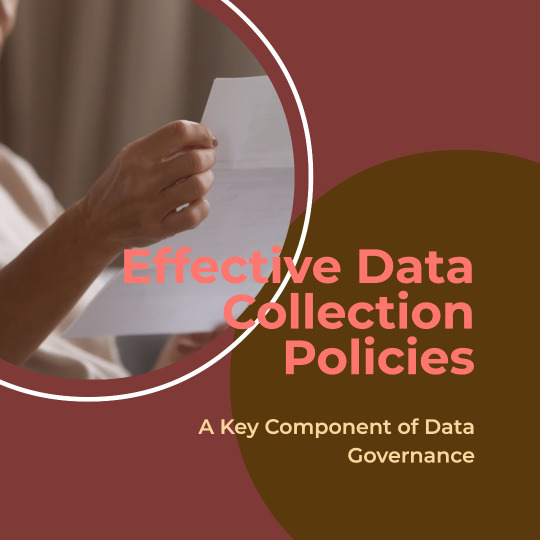
View On WordPress
0 notes